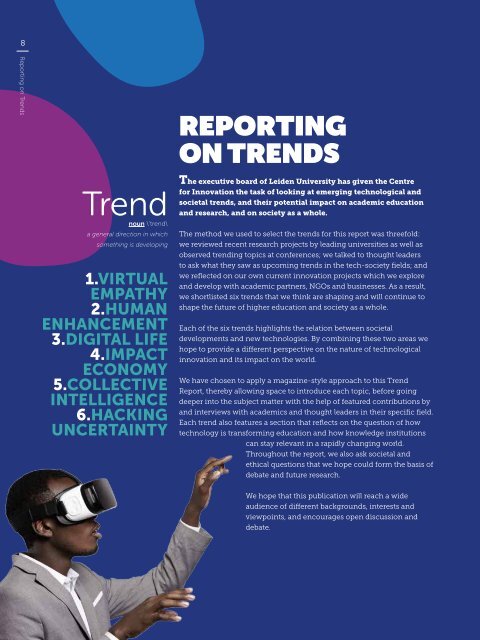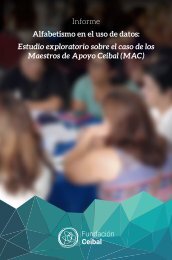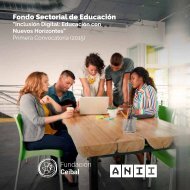trend-report-dps-web-version
You also want an ePaper? Increase the reach of your titles
YUMPU automatically turns print PDFs into web optimized ePapers that Google loves.
8<br />
9<br />
Reporting on Trends<br />
Trend<br />
noun \’<strong>trend</strong>\<br />
a general direction in which<br />
something is developing<br />
1.VIRTUAL<br />
EMPATHY<br />
2.HUMAN<br />
ENHANCEMENT<br />
3.DIGITAL LIFE<br />
4.IMPACT<br />
ECONOMY<br />
5.COLLECTIVE<br />
INTELLIGENCE<br />
6.HACKING<br />
UNCERTAINTY<br />
REPORTING<br />
ON TRENDS<br />
The executive board of Leiden University has given the Centre<br />
for Innovation the task of looking at emerging technological and<br />
societal <strong>trend</strong>s, and their potential impact on academic education<br />
and research, and on society as a whole.<br />
The method we used to select the <strong>trend</strong>s for this <strong>report</strong> was threefold:<br />
we reviewed recent research projects by leading universities as well as<br />
observed <strong>trend</strong>ing topics at conferences; we talked to thought leaders<br />
to ask what they saw as upcoming <strong>trend</strong>s in the tech-society fields; and<br />
we reflected on our own current innovation projects which we explore<br />
and develop with academic partners, NGOs and businesses. As a result,<br />
we shortlisted six <strong>trend</strong>s that we think are shaping and will continue to<br />
shape the future of higher education and society as a whole.<br />
Each of the six <strong>trend</strong>s highlights the relation between societal<br />
developments and new technologies. By combining these two areas we<br />
hope to provide a different perspective on the nature of technological<br />
innovation and its impact on the world.<br />
We have chosen to apply a magazine-style approach to this Trend<br />
Report, thereby allowing space to introduce each topic, before going<br />
deeper into the subject matter with the help of featured contributions by<br />
and interviews with academics and thought leaders in their specific field.<br />
Each <strong>trend</strong> also features a section that reflects on the question of how<br />
technology is transforming education and how knowledge institutions<br />
can stay relevant in a rapidly changing world.<br />
Throughout the <strong>report</strong>, we also ask societal and<br />
ethical questions that we hope could form the basis of<br />
debate and future research.<br />
We hope that this publication will reach a wide<br />
audience of different backgrounds, interests and<br />
viewpoints, and encourages open discussion and<br />
debate.<br />
FEATURE<br />
Ulrich Mans & Lucy Bernholz<br />
SHIFTING THE STARTING<br />
POINT: SHOULD WE<br />
GIVE MORE PRIORITY TO<br />
SOCIETAL IMPACT?<br />
INTRODUCING D-SEARCH: WHY UNIVERSITIES NEED TO<br />
ENGAGE MORE CLOSELY WITH KNOWLEDGE HOLDERS OUTSIDE<br />
ACADEMIC CIRCLES<br />
Much of today’s debate<br />
about the future of academia<br />
highlights the separation<br />
between fundamental and<br />
applied research philosophies.<br />
Without the freedom to explore<br />
new terrains and without<br />
preconceived targets for societal<br />
impact, we will lose much of<br />
the curiosity, serendipity and<br />
dedication to detail that is needed<br />
to push for the radically new. At<br />
the same time, universities need<br />
to engage more closely with those<br />
who hold knowledge outside<br />
academic circles, and listen to<br />
those who will put new ideas into<br />
practice. Creating sustainable,<br />
permeable relationships across<br />
disciplines and sectors can develop<br />
new research domains and<br />
accelerate the application of their<br />
findings. Doing so also embeds<br />
university expertise and resources<br />
directly in society in ways that<br />
align with today’s rapid distributed<br />
approaches to change.<br />
The advantages are threefold: 1) it<br />
fits a fast-moving environment,<br />
as it enables quick feedback<br />
loops and a more agile approach;<br />
2) it creates impact at the front<br />
end of the academic cycle and<br />
therefore justifies resources to be<br />
invested in further investments,<br />
including (fundamental) research<br />
trajectories; and 3) it stimulates<br />
transdisciplinary science that<br />
integrates local knowledge from<br />
citizens, public and private parties,<br />
many of whom may not have<br />
an academic mandate. This way<br />
it generates new avenues for<br />
universities to engage with society<br />
and reduces the effects of a classic<br />
‘ivory tower’ phenomenon.<br />
As Professor Tim Lewens writes<br />
in his recent book The Meaning of<br />
Science, there is not enough local<br />
knowledge that enters the research<br />
trajectories of today’s universities:<br />
‘The successful mobilisation<br />
of research for valuable ends<br />
demands attention to the sort of<br />
local knowledge that science often<br />
overlooks.’ (2015).<br />
Therefore it is important to invest<br />
in activities that underpin a<br />
university’s responsibility to explore<br />
the right balance between these<br />
two positions. We can do this by<br />
introducing an approach which<br />
embraces trajectories that could<br />
be labelled ‘d-search’ – the ‘d’<br />
standing for ‘design’ or ‘discover’.<br />
In other words: make innovation<br />
the starting point and let it feed<br />
research trajectories. We do not<br />
contend that this should be a<br />
mainstream approach; for now,<br />
it is an experimental avenue that<br />
supports finding new entry points<br />
of scientific enquiry. It encourages<br />
meaningful input from those<br />
shaping innovation outside our<br />
campuses.<br />
there is not<br />
enough local<br />
knowledge that<br />
enters the research<br />
trajectories of<br />
today’s universities<br />
Starting the Shifting Point





